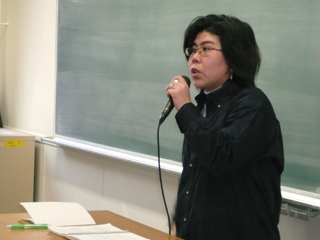 Yuji KATO
Yuji KATO
Graduate Student, ICU
【The article below is the same as the article that appears in the eighth issue of the CGS Newsletter.】
The lecture, “Questioning the Church and its Sanctity: Criticism of the Church from a Lesbian Perspective,” was held at ICU on February 2nd, 2007. The lecturer, Rev. Yuri Horie, has protested from within the church against the claims of the so-called Ito remark and the Okuma document (1998) that it is inappropriate for a homosexual to become a pastor of the United Church of Christ in Japan.
At the center of this opposition are not only Christian lesbians like Rev. Horie, but also heterosexual women who have criticized sexual discrimination within the Church. Both have raised their voices against the male-oriented and heterosexual-centered structure of the Church. However, in their joint struggle, Rev. Horie realized that while they had begun by considering homosexuality in its entirety, the issue somehow became reduced to “homosexual = gay,” and lesbians were often ignored. Even as women co-operate under the name of female solidarity, lesbians suffer the paradox of being denied their identity. This shows how the identity of lesbians can be endangered in their joint struggle with not only heterosexuals but even with other women. The structure of this conflict is not simple.
In response to this complex paradox, Rev. Horie proposed an approach which combines perspectives from both Feminist Theology and the so-called “critics of Christianity” in Japan. Feminist theologists argue that the Bible regenerates the discrimination that existed in the past when it was written. Critics of Christianity are known for their renouncement of the traditional church and criticism of the conservative nature of the United Church of Christ in Japan. They have often been ridiculed by the religious community for not being true Christians but a “Jesus sect,” which has created its own image of Jesus. However, are there any reasonable grounds for criticizing and labeling others as “disbelievers” in Christianity? On what basis does the religious community judge itself to be “the holy” and categorize people like homosexuals as dirty sinners?
Rev. Horie referred to Shizuka Uemura’s Iesu: Hito to Kami to (Jesus: Diety and Humanity (2005)), which considers Jesus as one who “appears in front of those who practice self criticism themselves in order to help them relativize themselves.” Do we not have to question ourselves continuously that the Jesus whom we or the church consider may not be the real Jesus, and that actions by us or the church may not be following his will? Learning from the example of Jesus, should we not be trying to relativize ourselves by transcending past interpretations of the Bible and consider the significance of what is happening here and now?
This self-criticism will, of course, also help to alert heterosexual women of how lesbian identity has been denied. Rev. Horie refuses to give up. She writes, “I want to find great ‘hope’ in the journey of our struggle and the possibilities that exist,” (Horie, 2006: 205). In her words, we can see her determination to achieve co-existence with the Church by criticizing it from within.
I also wish to join their struggle. Even in continuing to question myself and the people around me whom I treasure, I refuse to despair. In order to live in harmony with others, I, or we, want to live with “hope” as our guiding light.